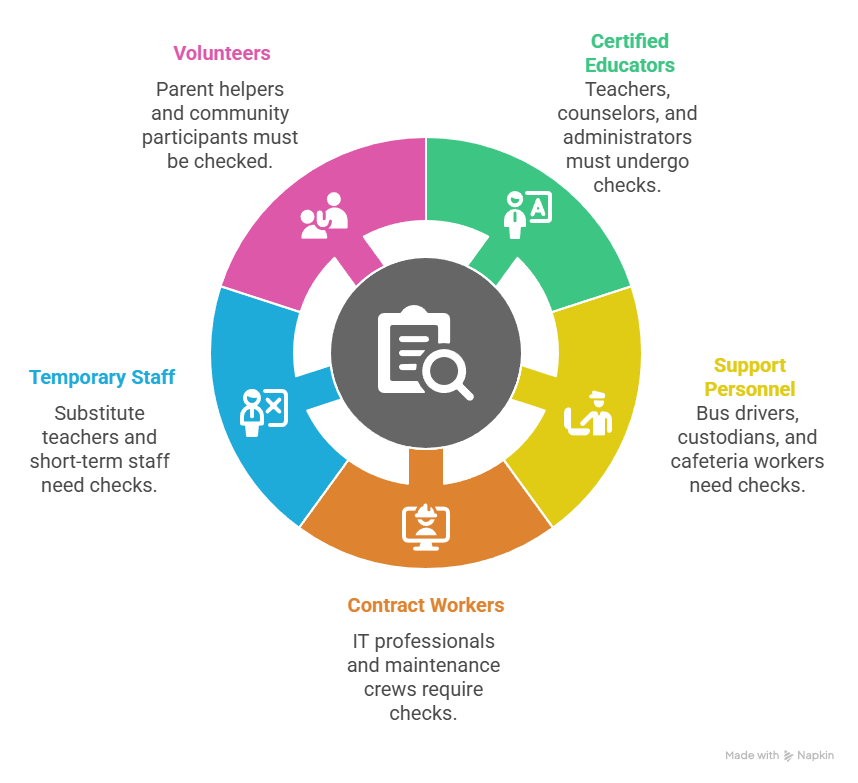Texas implements one of the nation's most comprehensive education background check systems, requiring FBI fingerprinting and continuous monitoring for all school personnel to ensure student safety. Understanding TEA requirements, FCRA protections, and position-specific screening protocols is essential for educators, administrators, and school districts navigating the hiring process in 2024.
Key Takeaways
- Texas mandates dual-level background checks combining FBI fingerprint-based reviews with Texas Department of Public Safety assessments for all education professionals.
- Continuous monitoring systems provide real-time arrest notifications throughout employment, helping schools respond immediately to new legal issues affecting staff members.
- Specific criminal offenses including felonies against children, sexual crimes, and severe drug violations result in permanent disqualification from Texas education positions.
- Job seekers maintain strong protections under FCRA, including rights to dispute inaccuracies and receive pre-adverse action notices before employment denial.
- Background check costs range from $90-$260 total, with some districts offering reimbursement programs to qualified candidates.
- The Texas Education Code §22.083 requires background checks for certified teachers, support staff, contractors, substitutes, and even classroom volunteers.
Understanding Texas Education Background Check Requirements
The Texas education system prioritizes student safety through rigorous vetting procedures mandated by the Texas Education Code (TEC) §22.083. Every individual working in Texas schools must undergo comprehensive screening that exceeds federal standards.
Core Components of Texas Screening
| Component | Description |
| State Criminal History | Texas DPS database review covering all adult criminal records |
| FBI Fingerprint Check | National database search for interstate criminal activity |
| Continuous Monitoring | Real-time arrest notifications through FACT Clearinghouse |
| TEA Certification Review | Verification through Educator Certification Online System (ECOS) |
These integrated systems work together to create multiple safety layers. The combination ensures comprehensive coverage that single-source checks might miss.
Who Must Complete Background Checks
Texas education background check requirements apply broadly across all school positions. The state recognizes that student safety depends on screening everyone with potential student contact.

- All certified educators including classroom teachers, school counselors, campus administrators, and instructional specialists must undergo comprehensive fingerprinting and criminal history reviews before beginning their assignments.
- Support personnel such as bus drivers, custodial staff, cafeteria workers, and administrative office employees require the same thorough background screening as teaching professionals to ensure campus safety.
- Contract workers providing services on school grounds, including IT professionals managing student data systems, maintenance crews with facility access, and third-party service providers, must complete full background checks before entering school premises.
- Temporary staff members like substitute teachers, short-term replacements, and seasonal employees face identical screening requirements regardless of their employment duration or frequency of student contact.
- Volunteers including parent helpers in classrooms, student teachers completing certification requirements, and community participants in school programs must pass background checks even for unpaid positions.
Even positions with minimal student interaction require clearance. This universal approach reflects Texas's commitment to comprehensive school safety protocols.
The TEA Certification and Fingerprinting Process
The Texas Education Agency streamlines background screening through a centralized system that combines online registration with biometric data collection. All education professionals must complete both ECOS certification requirements and fingerprinting at authorized locations before beginning work in Texas schools. This dual-component process ensures comprehensive vetting while maintaining efficient processing times for qualified candidates.
ECOS Registration Requirements
Setting up your Educator Certification Online System account initiates the Texas education background check process. This centralized platform manages all certification and screening activities for education professionals statewide. Accurate information entry proves critical since errors can delay processing by weeks.
The system requires personal identification details, employment history, and educational credentials. Registration fees vary by certification type, typically ranging from $40-$100. After payment processing, applicants receive detailed instructions for completing fingerprinting requirements.
Fingerprinting Procedures and Locations
Texas utilizes a statewide network of MorphoTrust/Identogo facilities to collect fingerprints for education background checks. The standardized process ensures consistent quality and rapid electronic submission to both state and federal databases.
| Aspect | Details |
| Provider | MorphoTrust/Identogo authorized locations |
| Required ID | Valid government-issued photo identification |
| Processing Time | 5-7 business days for results |
| Cost Range | $50-$60 per fingerprinting session |
| Scheduling | Online appointment system required |
Fingerprinting captures biometric data for both state and federal database searches. The electronic submission process eliminates traditional ink-based methods, improving accuracy and processing speed.
Criminal History Evaluation Standards
Texas maintains strict criteria for evaluating criminal records in education settings. The review process balances public safety with fair employment practices through established guidelines.
Automatic Disqualifying Offenses
Certain convictions result in permanent exclusion from Texas education employment. These non-negotiable standards protect vulnerable student populations from individuals with serious criminal histories.
- Crimes Against Children: Any felony involving child victims
- Sexual Offenses: All sexual crimes regardless of victim age
- Violent Felonies: Murder, kidnapping, aggravated assault
- Serious Drug Crimes: Manufacturing, distribution, or trafficking
- School-Related Offenses: Previous crimes on school property
No rehabilitation evidence or time passage changes these automatic disqualifications. Schools cannot hire individuals with these convictions under any circumstances.
Discretionary Review Process
Not all criminal offenses result in automatic disqualification from Texas education employment. The TEA conducts individualized assessments for certain misdemeanors, pending charges, and deferred adjudications to determine their relevance to education roles.
| Offense Category | Review Considerations |
| Misdemeanors | Relevance to education role, time elapsed, rehabilitation efforts |
| Pending Charges | Nature of allegations, legal status, potential impact |
| Deferred Adjudication | Completion status, offense type, disclosure compliance |
Administrative review teams evaluate cases individually when offenses don't trigger automatic disqualification. Factors like offense severity, rehabilitation evidence, and time passage influence decisions.
Ongoing Compliance and Monitoring Systems
Texas education background checks don't end at hiring—the state maintains continuous oversight throughout an employee's career. Advanced monitoring systems track criminal activity in real-time, alerting districts to new arrests or charges that could affect employment eligibility. This proactive approach ensures schools can respond quickly to emerging safety concerns while maintaining due process for employees.
Continuous Background Monitoring
Texas education background checks extend beyond initial hiring through sophisticated monitoring systems. The Fingerprint Applicant Clearinghouse of Texas (FACT) provides real-time arrest notifications for all registered education employees.
- Arrest Alerts: Immediate notification when employees face new charges
- Self-Reporting Requirements: Legal obligation to disclose arrests within specified timeframes
- District Response Protocols: Established procedures for handling new criminal information
- Privacy Protections: Secure systems limiting access to authorized personnel
This proactive approach identifies potential risks quickly, allowing timely administrative action. Districts must balance employee rights with student safety when responding to alerts.
Certificate Renewal Requirements
Educator certificates require renewal every five years, triggering fresh background checks. This periodic review ensures ongoing eligibility for education positions throughout careers. The renewal process verifies both professional development completion and continued criminal history compliance.
Certificate holders must maintain clean records between renewals. Any criminal activity can trigger immediate review, potentially resulting in suspension or revocation before the standard renewal date.
Position-Specific Screening Considerations
Different education roles require tailored background check approaches based on responsibilities and student access levels. Understanding these variations helps applicants and employers navigate appropriate screening protocols.
Administrative and Leadership Positions
School administrators face enhanced scrutiny reflecting their broad authority and access. Background checks for principals, assistant principals, and district administrators include additional verification layers.
- Financial History Review: Credit checks for positions managing budgets
- Employment Verification: Detailed confirmation of leadership experience
- Reference Investigations: Thorough checks with previous supervisors
- Professional Sanctions: Review of any disciplinary actions in other states
Leadership positions demand the highest integrity standards. Even minor issues can disqualify candidates from these critical roles.
Specialized Education Roles
Certain education positions require enhanced screening protocols based on their unique responsibilities and student populations served. These targeted background checks address specific risks associated with roles like special education, technology management, counseling, and athletic coaching.
| Position Type | Additional Screening Focus |
| Special Education | History with vulnerable populations |
| Technology Staff | Cybersecurity and data protection record |
| Counselors | Mental health and professional licensing |
| Coaches | Youth organization involvement history |
These targeted reviews address position-specific risks while maintaining overall safety standards. Specialized roles often require supplementary certifications with their own background check requirements.
Support Staff Screening
Support staff background checks focus on ensuring safe school environments despite limited instructional roles. Bus drivers undergo Department of Transportation checks alongside standard education screening. Maintenance and custodial staff face reviews emphasizing property crimes and workplace safety records.
Even positions without direct student instruction require thorough vetting. Texas recognizes that all school employees contribute to the overall safety culture.
Rights and Protections for Job Seekers
Job applicants in Texas education maintain substantial legal protections throughout the background check process under federal and state law. The Fair Credit Reporting Act ensures transparency, accuracy, and opportunities to dispute incorrect information before adverse employment decisions. Understanding these rights empowers candidates to navigate screening procedures confidently while protecting their interests.
FCRA Compliance Requirements
The Fair Credit Reporting Act provides essential protections during Texas education background checks. Employers must follow specific procedures ensuring transparency and accuracy throughout the screening process.
- Written Consent: Clear disclosure and authorization before conducting checks
- Standalone Documents: Consent forms separate from employment applications
- Report Access: Right to receive copies of background check results
- Dispute Process: Formal procedures for challenging inaccurate information
- Pre-Adverse Action: Notice requirements before employment denial
These protections ensure fair treatment while maintaining thorough screening standards. Understanding FCRA rights helps candidates navigate the process confidently.
Appeal and Dispute Procedures
When background checks contain errors or questionable information, Texas provides structured appeal processes. Candidates can challenge both report accuracy and employment decisions based on criminal history. The dispute process typically involves submitting documentation to correct errors or provide context for past incidents.
Appeals for certification denial go through administrative law judges who evaluate evidence impartially. Legal representation during appeals can significantly improve success rates, though it's not required.
Financial Considerations and Support Options
The costs associated with Texas education background checks can create barriers for otherwise qualified candidates entering the profession. Total expenses typically range from $90 to $260, encompassing various fees for processing, fingerprinting, and position-specific requirements. Fortunately, many districts and organizations offer financial assistance programs to help offset these initial employment costs.
Background Check Cost Breakdown
Texas education background check expenses vary by position and district requirements. Understanding total costs helps candidates budget appropriately for the application process.
| Fee Type | Typical Range | Notes |
| ECOS Processing | $40-$100 | Varies by certification level |
| Fingerprinting | $50-$60 | Standard Identogo rates |
| Additional Checks | $30-$100 | Position-specific requirements |
Total costs generally range from $90-$260 depending on the specific position and any supplementary screening requirements.
Available Financial Assistance
Many Texas school districts recognize that background check costs can burden qualified candidates. Various support programs help reduce financial barriers to education employment.

- District reimbursement programs provide full or partial cost coverage for background check expenses after successful hiring and completion of probationary periods.
- State and local grant programs offer financial assistance specifically designated for educator preparation costs, including background check and certification fees.
- Flexible payment plans allow candidates to spread background check costs over several months rather than paying the entire amount upfront.
- Conditional employment offers include provisions where the hiring district pays for all background check expenses contingent upon the candidate accepting and maintaining the position.
Candidates should inquire about available assistance during the application process. Human resources departments can provide specific information about district policies and support options.
Technology and Future Developments
Current Technological Advances
Digital innovations continue transforming Texas education background checks in 2024. Artificial intelligence enhances pattern recognition in criminal history reviews, identifying potential concerns human reviewers might overlook.
- Biometric Accuracy: Advanced fingerprint scanning reduces false matches
- Blockchain Security: Tamper-proof record storage ensuring data integrity
- Real-Time Integration: Instant database updates across agencies
- Mobile Accessibility: Smartphone-based application and tracking systems
These technologies improve both efficiency and reliability while maintaining strict privacy protections. Schools benefit from faster processing without sacrificing thoroughness.
Emerging Trends and Considerations
Future developments in background screening technology promise even greater improvements. Predictive analytics may help identify rehabilitation patterns, while enhanced interstate data sharing could close current information gaps. However, these advances must balance innovation with privacy rights and fair employment practices.
Texas continues evaluating new technologies for potential implementation. The state prioritizes solutions that enhance safety while respecting individual rights and maintaining efficient hiring processes.
Best Practices for School Districts
School districts serve as the frontline implementers of Texas background check requirements, bearing responsibility for maintaining compliance while ensuring fair hiring practices. Effective management requires comprehensive policies, regular staff training, and systematic documentation procedures. Districts that prioritize these elements create safer schools while minimizing legal risks and administrative challenges.
Policy Development and Implementation
School districts must establish clear, comprehensive background check policies aligned with state requirements. Written procedures should address all employee categories while ensuring consistent application across positions.
Effective policies include specific timelines, responsible parties, and decision criteria. Regular policy reviews ensure continued compliance as regulations evolve. Districts should also establish clear communication channels for questions and concerns about background check procedures.
Training and Compliance Management
| Training Component | Frequency | Target Audience |
| Legal Requirements | Annual | HR staff and administrators |
| System Updates | As needed | All hiring managers |
| Privacy Protocols | Bi-annual | Anyone accessing records |
| Documentation Standards | Quarterly | HR and compliance teams |
Regular training ensures all staff understand their roles in maintaining compliance. Documentation requirements deserve particular attention since proper record-keeping protects districts during audits or legal challenges.
Conclusion
Texas education background checks represent a comprehensive approach to school safety that balances thorough screening with fair employment practices. Understanding TEA requirements, fingerprinting procedures, and ongoing compliance obligations helps all stakeholders navigate this complex but essential system. As technology advances and regulations evolve, staying informed about current requirements and best practices ensures successful outcomes for educators, administrators, and most importantly, the students they serve. By maintaining high standards while respecting individual rights, Texas continues leading the nation in educational safety protocols.
Frequently Asked Questions
How long does a Texas education background check take to complete?
The typical Texas education background check takes 5-7 business days after fingerprinting, though additional time may be needed for ECOS processing and any follow-up investigations.
Can I work in a Texas school with a misdemeanor on my record?
Many misdemeanors don't automatically disqualify candidates from Texas education positions. The TEA reviews each case individually, considering factors like the offense type, time elapsed, and relevance to education.
Do substitute teachers need the same background checks as full-time teachers?
Yes, substitute teachers must complete the same comprehensive background checks as full-time educators, including FBI fingerprinting and state criminal history reviews.
What happens if I'm arrested after being hired by a Texas school?
Texas law requires employees to self-report arrests, and the continuous monitoring system will also alert the district. The school will review the situation and may place you on administrative leave pending investigation.
Are private schools in Texas required to conduct background checks?
Yes, both public and private schools in Texas must conduct background checks on all employees who have contact with students, as mandated by state law.
How much do Texas education background checks cost in total?
Total costs typically range from $90-$260, including ECOS processing fees ($40-$100) and fingerprinting charges ($50-$60), though some positions may require additional screenings.
Additional Resources
- Texas Education Agency - Fingerprinting Information
https://tea.texas.gov/texas-educators/certification/fingerprinting - Texas Department of Public Safety - Criminal History Checks
https://www.dps.texas.gov/section/crime-records/criminal-history-search - FACT Clearinghouse - Continuous Monitoring System
https://www.fact.texas.gov/ - U.S. Equal Employment Opportunity Commission - Background Checks
https://www.eeoc.gov/laws/guidance/background-checks-what-employers-need-know

GCheck Editorial Team
Meet the GCheck Editorial Team, your trusted source for insightful and up-to-date information in the world of employment background checks. Committed to delivering the latest trends, best practices, and industry insights, our team is dedicated to keeping you informed.
With a passion for ensuring accuracy, compliance, and efficiency in background screening, we are your go-to experts in the field. Stay tuned for our comprehensive articles, guides, and analysis, designed to empower businesses and individuals with the knowledge they need to make informed decisions.
At GCheck, we're here to guide you through the complexities of background checks, every step of the way.





